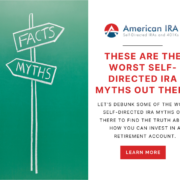Consider Private Note Investing in a Self-Directed IRA
Investors seeking to diversify their retirement portfolios may consider investing in private notes within a Self-Directed IRA. Why? A Self-Directed IRA is a tax-advantaged retirement account that allows investors to choose their own investments, including private notes. This means investors can issue notes from a self-Directed IRA, which creates a different type of asset class within a retirement portfolio. Through that asset class, investors can potentially generate what becomes mostly passive income into the IRA. But knowing how private notes work is essential. Let’s explore why investors like you might consider this style of investing within a retirement account.
What are Private Notes?
Private notes are debt securities that can be issued by individuals, corporations, or even real estate projects. They offer investors a fixed income stream over a specific period, and the borrower agrees to repay the principal amount at the end of the term. Private notes are typically secured by collateral, such as real estate or other assets, and offer investors a higher yield than traditional fixed-income investments. However, both secured and unsecured private notes exist.
Why Consider Private Note Investing in a Self-Directed IRA?
There are a few reasons to consider private note investing. For instance, diversification. Investors often allocate a significant portion of their retirement savings to stocks and bonds. However, by investing in private notes through a Self-Directed IRA, investors can diversify their portfolio and potentially reduce their overall risk. Private notes may not be directly correlated to traditional investments and can offer investors a unique opportunity to hedge against market volatility.
There are also the tax benefits of Self-Directed IRA investing to consider. Self-Directed IRAs offer tax-deferred or tax-free growth, depending on the type of account. This means that the interest income earned on private notes is tax-free or tax-deferred until withdrawn from the account. Additionally, any gains from the sale of private notes within a Self-Directed IRA are also tax-free or tax-deferred.
Investors who enjoy more control in their investments may also find this style of investing advantageous. Investors can research and select private notes that align with their investment goals and risk tolerance. By having control over their retirement investments, investors can potentially earn higher returns than with traditional investment options.
Finally, there’s flexibility to consider. You won’t be limited to private notes here. Self-Directed IRAs can be used to invest in a wide range of assets, including real estate, private equity, and precious metals, in addition to private notes. This flexibility allows investors to build a diversified portfolio that aligns with their investment goals and risk tolerance.
Risks to Consider When Investing in Private Notes
While private note investing can offer investors potential benefits, it is important to also consider the potential risks. Private notes may have a higher level of credit risk compared to traditional fixed-income investments. Additionally, private notes may be less liquid than other investments, meaning that they may be more difficult to sell or may have longer hold periods.
Investors should also be aware of potential fraudulent schemes associated with private note investments. Before investing in private notes, investors should research the issuer and the terms of the note to ensure that it aligns with their investment goals and risk tolerance.
Is It Time to Start Investing in a Self-Directed IRA?
Investing in private notes within a Self-Directed IRA can offer investors a unique opportunity to diversify their retirement portfolio and potentially earn higher returns. Even so, you’ll need to consider the potential risks associated with private note investing and conduct thorough due diligence before making any investment decisions.
Interested in learning more about Self-Directed IRAs? Contact American IRA, LLC at 866-7500-IRA (472) for a free consultation. Download our free guide or visit us online at www.AmericanIRA.com.








